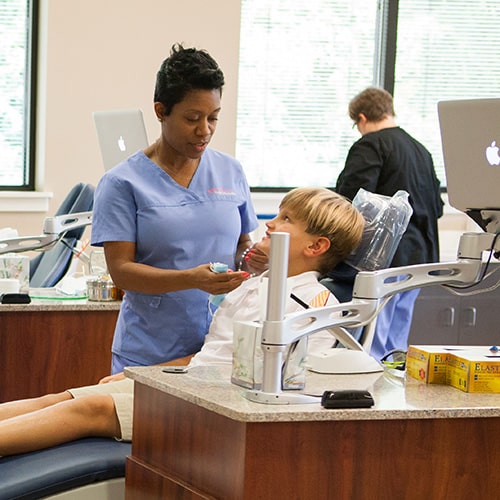WE HAVE THE ANSWERS
Why should I go to an Orthodontist for braces and not my general dentist?
In the dental field there are specialists, much like there are in the field of medicine. An orthodontist is a specialist in the correct tooth movement, alignment, and jaw growth. After dental school, a potential orthodontist returns to school for post-graduate study lasting 2-3 years to achieve an advanced degree in orthodontics. Orthodontists strive to maintain knowledge of current orthodontic practices and take numerous continuing education classes focusing on innovation, new practices and clinical research, and dentofacial orthopedics.
Does I need a dentist referral?
No! While dentists often make referrals, anyone wanting to correct or change their smile can make a consultation appointment.
Can I just have a retainer to move my teeth?
Retainers are the last step of orthodontic treatment. Retainers are great for their specific purpose — maintaining/retaining the current position of teeth. To actually reposition and align teeth, braces or Invisalign is necessary.
Can I still play sports?
Yes! We ask that you use a mouth guard, to help protect your teeth and braces. You can use the type you pick up at a sports store or from the dental section in stores. These are guards you can mold to your current mouth size and shape. There are also custom mouth guards available from many general dentists.
Can I send in my friends for a consultation?
Absolutely! We love having friends of patients come into our office!
Do I still need to see my dentist during orthodontic treatment?
Yes. Your dentist is a very important part of your treatment team. They will continue to do exams and cleanings, and, if necessary fillings, crowns, bridges, implants.
Will insurance cover everything?
Insurance coverage for orthodontic treatment varies by dental plan. Typically, insurance will not cover the total treatment fee. However, many dental insurance plans cover at least a portion of the treatment fee. We review your estimated insurance coverage at the consultation appointment.
Do you bill insurance?
Absolutely, and we accept direct payment also. It is a service we are pleased to offer our patients.
Do you offer payment plans/options?
We offer multiple payment options, including non-interest payment plans that work with most budgets. These options are available regardless of insurance coverage and are typically explained during the initial consultation.
When should I schedule an appointment?
Children > The American Association of Orthodontics recommends that children should have an evaluation by age 7. This doesn’t mean that treatment automatically begins at age 7, it’s just the optimal age to first see an orthodontist. But if treatment is needed, it can prevent more complex treatments in the future.
Adults > Any time! If you want to have your teeth straightened, aren’t happy with your smile, need orthodontic movement of teeth for implants or cosmetic dentistry, or if you need surgically assisted orthodontic correction, come in for a consultation.
Won’t my child’s teeth automatically grow into a straight position?
Generally, they don’t. Genetics, finger habits like thumb sucking, allergies, breathing problems, and enlarged tonsils and adenoids affect how teeth grow in children while developing. A consultation while your child is still developing allows the orthodontist to intervene at the correct time to assist growth and create space for naturally crowded teeth.
Do braces hurt?
Braces can make your mouth sore temporarily. We like to compare it to how your muscles can feel sore after a work-out. We recommend getting back to a normal diet as soon as possible after adjustments to minimize the soreness. If you find that your teeth are sore, we advise taking some Tylenol or whatever your physician recommends for discomfort, just prior to your adjustment appointment. We work hard to incorporate the latest technology to reduces the amount of discomfort experienced by our patients.
Do you give shots?
We do not. They are not necessary for routine orthodontic treatment.
How long is treatment?
Anywhere from 6-30 months. The length of treatment depends on your unique treatment needs and is typically reviewed during the initial consultation. The best way to make sure that treatment timeline stays on-track is to get to all of your appointments and wear any appliances we give you at home as much as possible.
Do I need to have teeth removed?
Each orthodontic treatment case is different. Some people do not need to have teeth removed while others, who may have extensive crowding, will benefit from the removal of teeth. This is another question that is addressed during the initial consultation. Less than 10% of patients in our practice require tooth removals due to the diagnosis and technology that our orthodontists use.
When can I schedule appointments for myself or my child?
We schedule appointments in all day, Monday through Friday. There are some types of appointments that are scheduled in the morning only — these generally include appliance placement, braces placement, and repositioning or replacement of a bracket or band that breaks off. Appointments in the afternoon are when most students prefer to be seen for the regular adjustments.
For your convenience, we also offer early morning appointments staring at 7:30 AM for those wanting to come in before work or before classes, and see patients until 6 PM Monday — Thursday (5 pm on Friday).
Can I or my child return to work or school following placement of appliances, braces, or regular orthodontic appointments?
Definitely. You or your child may have sore teeth following any of the above appointments, but it generally is not enough to prevent returning to work/school.
How often are appointments?
Typically every 6-10 weeks for adjustments or a “regular appointment”. Your next appointment is scheduled before you leave the office after every visit.
Can I still have braces if I have crowns, missing teeth, or still have baby teeth even though I’m an adult?
Yes! Each of these concerns will be addressed during your consultation.




